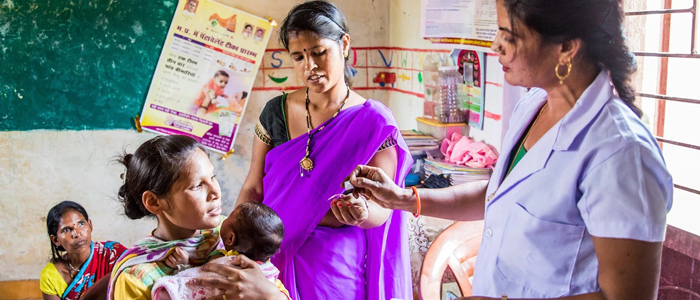Health seeking behaviour in four Indian States
Project Details

This study aims to provide an understanding of health seeking behaviour in two States with low levels of health system development: Odisha and Uttar Pradesh; and two with higher levels of health system development: Maharashtra and Punjab.
The study sheds light on the questions of out-of-pocket spending, catastrophic health expenditure and distress financing, and treatment pathways in four states of India - Odisha, Uttar Pradesh (UP), Maharashtra and Punjab. The rationale for this is to better understand the differences between health seeking behaviour in more and less developed health systems at the State level in India, and to sharpen hypotheses about the evolution of health seeking behaviour as health systems develop effectively. The study provides valuable insights for health system interventions yet to be introduced, that seek to strengthen elements such as public primary care.
Using multiple methods the study delves into the following questions:
- What factors are associated with (a) the decision to use medical care and (b) the choice among available medical providers?
- What are the health expenditure consequences of both decisions, and with respect to Catastrophic and Impoverishing Health Expenditures?
- What are the earnings (wages and other sources of income of households) consequences of both decisions?
- What are the patterns of resort (what are the common pathways between providers and provider type including primary and higher levels; public and private; qualified and unqualified) in relation to a chronic condition common among adults, an acute condition common among children, and gynaecological problems among women?
Researchers
Professor Barbara McPake
Professor Sumit Kane - Primary contact
Professor Ajay Mahal
Collaborators
National Council for Applied Economic Research (NCAER)
The Population Council
Funding
Bill and Melinda Gates Foundation
Research Publications
- Sumit Kane, Madhura Joshi, Ajay Mahal, Barbara McPake,
How social norms and values shape household healthcare expenditures and resource allocation: Insights from India, Social Science & Medicine, - Sumit Kane, Madhura Joshi, Sapna Desai, Ajay Mahal, Barbara McPake,
People's care seeking journey for a chronic illness in rural India: Implications for policy and practice, Social Science & Medicine, Volume 312, - Mulcahy P, Mahal A, McPake B, Kane S, Ghosh PK, Lee JT. Is there an association between public spending on health and choice of healthcare providers across socioeconomic groups in India? - Evidence from a national sample. Soc Sci Med. 2021 Sep;285:114149
- Findings from a Survey on Health Care Seeking for Chronic and Acute Illnesses - Executive Summary
- Ghosh, Prabir Kumar, Mahal, Ajay, Kane, Sumit, Kumar, Sumit, Zeenat Ali, Shayequa, Jain, Charu, Sahu, Sagari, Sanyal, Sree, Negi, Chanchal, Chowdhury, Madhura, & McPake, Barbara. (2023). Health Seeking Pathways in Four Indian States Of India. Zenodo.
- Policy Brief - Importance Of Investing in Improving Public Primary Healthcare
- Policy Brief - Value Of Investments in Public Healthcare Sector
- Ghosh PK, Kane S, Kumar S, Ali SZ, Sahu S, Sanyal S, Chowdhury M, McPake B, Mahal M. Health seeking pathways in Uttar Pradesh and Odisha, India. National Council of Applied Economic Research and Nossal Institute For Global Health, Melbourne. 2021
Research Group
Social & Cultural Dimensions of Health Systems Emerging Programs in Global Health
School Research Themes
Prevention and management of non-communicable diseases (including cancer), and promotion of mental health, Disparities, disadvantage and effective health care, Data science, health metrics and disease modeling
Key Contact
For further information about this research, please contact the research group leader.
Department / Centre
Nossal Institute for Global Health
MDHS Research library
Explore by researcher, school, project or topic.